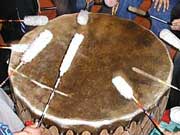|
Photos
More from MPR
Your Voice
|
Part 4: One church, two traditions
August 20, 2003
 |
| St. Mary's Mission Church combines symbols of spirituality from Native American beliefs and the Catholic faith. (MPR Photo/Tom Robertson) |
Red Lake Reservation — About 2,000 people living on the Red Lake Indian Reservation are baptized Catholics. That's half the population.
The Red Lake Reservation is located about 30 miles north of Bemidji. Each Sunday, several dozen people attend Mass at St. Mary's Catholic Mission. The mission was established at Red Lake in 1858. There's been a Catholic elementary school here for more than 100 years.
 | |||
Father Bill Mehrkens is a priest at St. Mary's. He's been here more than a decade. He says missionaries often forced Christianity upon the people.
"I'm amazed that there's not more anger than there is, but I see it at times and in different persons. ... I think that if I were an Indian person, I'd be angry," says Mehrkens. "There has been real closed-mindedness of the church in dealing with Indian tradition and the Indian people in the past in our history."
Mehrkens says living on the reservation has changed him.
"My attitude toward the Indian, the Ojibwe medicine people, was quite negative before I came here. I thought that there was a lot of superstition in it. I no longer feel that way. I misunderstood what they were doing and saying," Mehrkens says.
 | |||
The once rigid Catholic Church began softening in the early 1960s. It's now acceptable to include cultural symbols and traditions in the worship service.
The white walls of St. Mary's Mission are adorned with Indian symbols. An Indian prayer circle hangs above the altar. It signifies the circle of life, a prominent concept in American Indian spirituality. Colorful Indian shawls are draped around the statues of Mary and Joseph. The church uses plants that are sacred to traditional Indians.
"Sometimes in worship, we use the burning of tobacco, sometimes we use the burning of the sage and sweetgrass and cedar boughs, and we see no clash in these things," says Merhkens.
The Catholic Church believes it is reaching out to American Indians. But some traditional Red Lake Indians are skeptical. Jodie Beaulieu says the church is now stealing symbols it once tried to destroy.
 | |||
"At one time our ways weren't good enough. And the Catholic Church played a big part in denying that," says Beaulieu. "It's almost like, 'We couldn't civilize you and make you Christians our way, so maybe we'd better do another number on you and integrate some of your ways, now that you're all coming back into it.'"
A growing number of Christian Anishinaabe are exploring their spiritual roots. Some have made a clean break from Christianity. Others are trying to keep a foot in both worlds.
"I think where you might find different perspectives are people who are really Christian, but still want to maintain some connectedness to their Native roots," says Tony Treuer, an Ojibwe language professor at Bemidji State University.
"They'll say, 'My religion is Christianity, but I'm still Native American and I still practice some of these ancient life ways.' And I think most people, regardless of their religious choices, will often go ahead and do things like get an Indian name, go to feasts, go to powwows, and certain other ceremonies. Those are things that sort of transcend religious choices, but they are still spiritual things," says Treuer.
 | |||
Acceptance and tolerance are part of Indian culture. But there are rifts among Christians and traditional Native people on Red Lake. Churches recently sponsored a reservation wide-prayer day, and traditional spiritual leaders refused to participate. Sometimes families are divided by dueling beliefs. Treuer says the split is most visible when someone dies.
"Occasionally, you'll see families so divided that someone commissions someone to send them off in the Indian custom, and someone else goes and gets a preacher, and they show up at the same funeral. I've seen that happen before. And usually one or the other says, 'I can't do that, I'm sorry. You guys have to make a choice. It's the family's choice and you have to do it together," says Treuer.
Multi-faith families sometimes disagree on how to raise children. On this day at St. Mary's Church in Red Lake, there's a baptism. It's caused some tension within the family of two-year-old Jaylin Kelly. One grandfather follows the traditional Indian way. The other, Charles Kelly, was raised Catholic.
"I've always respected our traditional ways and brought it together with the Catholic way of life," says Kelly. "I've been married with my wife for 18 years. We got married in this very church. We're baptizing our grandson today, which is a very good thing."
 | |||
As the priest pours the baptismal water over Jaylin's head, the youngster cries loudly.
The baptism was difficult for Vince Olson to watch. He's Jaylin's other grandfather. Olson follows traditional spiritual ways. He says the boy's reaction was a sign.
"When they went to put that water on him, he made up his mind, he made that choice, 'No.' He didn't accept that," says Olson. "Our way of life, our way of believing, I believe doesn't fit the way that we did today. But I know my grandson, he's going to be able to see and pick, as he gets older, what he's going to want and what he wants in his life."
|
News Headlines
|
Related Subjects
|

